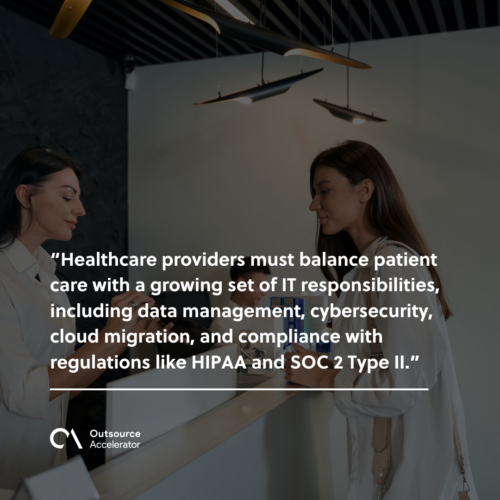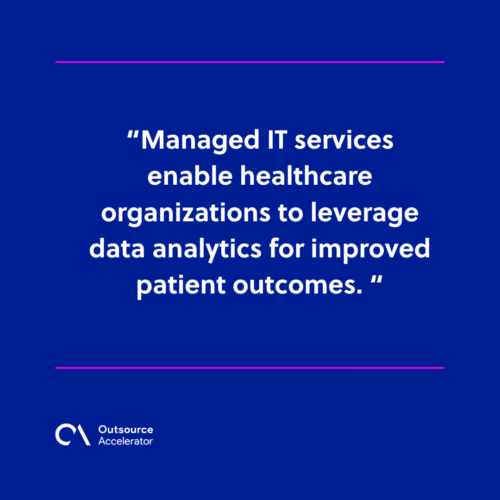Beyond the bedside: How healthcare virtual assistants enhance clinic efficiency

This article is a submission by MotivIT. MotivIT provides IT services globally using advanced technology for contact center solutions, software development, cloud services, network operations centers, global desk service, and managed IT services.
In today’s fast-evolving healthcare landscape, technology plays a crucial role in delivering quality patient care. However, the increasing reliance on digital systems brings forth challenges such as cybersecurity risks, compliance requirements, and IT infrastructure management.
Managed IT services have become indispensable for healthcare organizations, ensuring smooth operations, regulatory compliance, and optimal security.
Addressing the complexities of healthcare IT
Healthcare providers must balance patient care with a growing set of IT responsibilities, including data management, cybersecurity, cloud migration, and compliance with regulations like HIPAA and SOC 2 Type II.
These technical demands can overwhelm in-house teams, leading to inefficiencies, security vulnerabilities, and regulatory risks.
Herein lies the role of managed IT services. By outsourcing IT operations to expert providers, healthcare institutions can focus on what matters most—delivering exceptional patient care while maintaining a secure, compliant, and efficient digital environment.

Key benefits of managed IT services in healthcare
1. Robust cybersecurity & compliance
Cyber threats pose a significant risk to healthcare organizations, making cybersecurity a top priority. Managed IT services provide:
- HIPAA & SOC 2 Type II compliance – Ensuring that healthcare facilities meet stringent data protection and privacy standards.
- Advanced threat detection – Identifying and mitigating cyber risks before they escalate.
- Data encryption & secure access controls – Protecting patient records from unauthorized access and breaches.
2. Scalable IT infrastructure
As healthcare organizations grow, their IT needs evolve. Managed IT services offer scalable solutions, including:
- Cloud computing & remote access – Enabling seamless operations for healthcare providers, especially in multi-location setups.
- 24/7 network monitoring – Preventing downtime and ensuring that systems are always operational.
- Customized IT support – Tailored solutions to meet the unique needs of clinics, hospitals, and specialty care centers.
3. Enhanced operational efficiency
A well-managed IT environment reduces disruptions and streamlines workflows, leading to:
- Automated IT management – Leveraging AI-powered automation to handle repetitive tasks efficiently.
- Proactive maintenance – Addressing IT issues before they impact patient care.
- Optimized EHR systems – Ensuring electronic health records (EHR) are integrated, accessible, and secure.
4. Cost savings & predictable budgeting
Managed IT services eliminate the need for expensive in-house IT teams while offering predictable costs through subscription-based models. Clinics and hospitals can:
- Reduce operational costs by outsourcing IT needs.
- Avoid unexpected IT expenses with a flat-rate pricing model.
- Maximize ROI with strategic IT investments tailored to their needs.
Cutting-edge technologies in healthcare IT
Here are a few examples of advanced technologies that the healthcare IT sector is adopting:
Artificial Intelligence (AI) & machine learning
AI-driven IT solutions enhance cybersecurity, automate routine IT maintenance, and optimize patient data management. With predictive analytics, AI helps healthcare providers foresee potential system failures and prevent disruptions before they occur.
Internet of Medical Things (IoMT)
The IoMT connects medical devices to IT networks, improving remote monitoring, diagnostics, and patient care. Managed IT services ensure secure and seamless integration of IoMT devices while maintaining data privacy and compliance.
Blockchain for data security
Blockchain technology enhances data integrity and security in healthcare IT. Managed IT service providers leverage blockchain to create tamper-proof medical records and streamline data-sharing between healthcare institutions securely.
Cloud-based healthcare solutions
Cloud computing enhances data accessibility and storage efficiency. Managed IT services ensure a secure cloud infrastructure, enabling real-time data access, telemedicine solutions, and seamless collaboration among healthcare professionals.
The role of managed IT services in telemedicine expansion
The rise of telemedicine has dramatically increased the need for robust and secure IT infrastructure. Managed IT providers are vital in ensuring the reliability and security of telemedicine platforms.
This includes managing video conferencing systems, securing patient data transmitted during virtual consultations, and ensuring compliance with telemedicine-specific regulations.
They also provide technical support for both healthcare providers and patients, facilitating seamless remote care.
Data analytics and predictive healthcare
Managed IT services enable healthcare organizations to leverage data analytics for improved patient outcomes. By managing and analyzing large volumes of patient data, these services can help identify trends, predict potential health issues, and personalize treatment plans.
This data-driven approach enhances the efficiency and effectiveness of healthcare delivery, allowing providers to make informed decisions and improve patient care.

Enhancing patient experience through technology
Modern healthcare demands an enhanced patient experience. Managed IT services contribute by implementing and managing technologies that improve patient engagement and satisfaction.
This includes patient portals for easy access to medical records, online appointment scheduling, and secure communication channels.
By streamlining these processes, healthcare providers can improve patient access to care and enhance overall satisfaction.
Disaster recovery and business continuity in healthcare
Healthcare organizations must ensure continuous operations, even in the event of disasters. Managed IT providers offer disaster recovery and business continuity plans tailored to the unique needs of the healthcare sector.
This includes data backup and recovery, system redundancy, and rapid restoration of critical services. These plans ensure that patient care is not disrupted and that data remains secure and accessible during emergencies.
Strategic IT planning for healthcare growth
Managed IT services provide strategic IT planning to align technology investments with the long-term goals of healthcare organizations. They assess current IT infrastructure, identify areas for improvement, and recommend solutions that support growth and innovation.
This includes planning for future technology upgrades, managing IT budgets, and ensuring that IT strategies align with evolving healthcare regulations and industry best practices.
The future of healthcare IT
As healthcare technology continues to evolve, managed IT services will remain a critical component of operational success. By embracing cutting-edge solutions, ensuring compliance, and maintaining strong cybersecurity defenses, healthcare institutions can provide seamless and secure patient care.







 Independent
Independent




